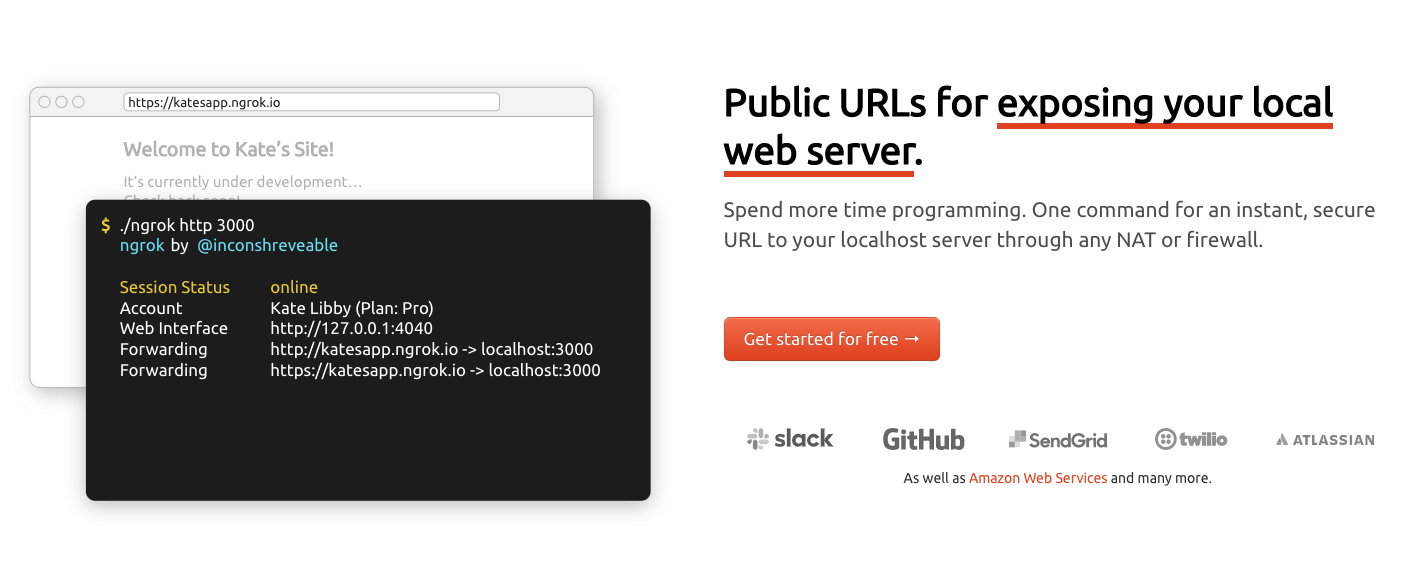Developing locally
This section illustrates how you can use ngrok to listen for transaction webhooks and serve your applications user-interface application during local development/testing.
ngrok is a useful tool for local web application development. It allows you to generate public URL's which tunnel traffic to the specified ports on your localhost.

Install ngrok
ngrokYou can download and install ngrok from this location. Follow the instructions to unzip the executable in a folder. Next, sign up for an account on the ngrok website, and connect your instance of the ngrok client to your online account by copying your ngrok auth token from your account and running this command in your shell:
$ ngrok authtoken <YOUR_AUTHTOKEN>
Generate individual tunnels for serving user-interface and webhook requests
webhook requestsCreate a new YAML file with the following content - specifying unique ngrok tunnels for your integrations user-interface and back-end application modules. This way - if you are running your user-interface on localhost:8080 and your back-end webhook listener on localhost:3000 - you can ask ngrok to create individual public URL's that tunnel traffic to each of these ports.
tunnels:
user-interface:
proto: http
addr: 8080
back-end:
proto: http
addr: 3000
Save the above content in a file titled ngrok.yml in the appropriate location for the operating system:
/Users/{{user_id}}/.ngrok2/ngrok.yml
/Users/{{user_id}}/.ngrok2/ngrok.yml
C:\Users\{{user_id}}\.ngrok2\ngrok.yml
Then, execute the following command in the ngrok shell:
$ ngrok start --all
This sets up two tunnels between ngrok.io and localhost:3000 and localhost:8080 on the computer. After the command is executed, this output appears on screen:
ngrok by @inconshreveable (Ctrl+C to quit)
Session Status online
Account EPC (Plan: Free)
Version 2.3.35
Region United States (us)
Web Interface http://127.0.0.1:4040
Forwarding http://3d5e2d38.ngrok.io -> http://localhost:8080
Forwarding https://3d5e2d38.ngrok.io -> http://localhost:8080
Forwarding http://db0a1b1c.ngrok.io -> http://localhost:3000
Forwarding https://db0a1b1c.ngrok.io -> http://localhost:3000
Connections ttl opn rt1 rt5 p50 p90
0 0 0.00 0.00 0.00 0.00
Note that the public addresses of the tunnels created on ngrok.io are https://3d5e2d38.ngrok.io and https://db0a1b1c.ngrok.io.
Register interfaceUrl and webhook URLs in product configuration
interfaceUrl and webhook URLs in product configurationThese two URLs can now be registered in the product configuration as the webhook URL and interfaceUrl respectively.
{
"interfaceUrl": "https://3d5e2d38.ngrok.io",
"webhooks": [
{
"resource": "urn:elli:epc:transaction",
"events": [
"created",
"updated"
],
"signingkey": "{{WEBHOOK_SHARED_SECRET}}",
"url": "https://db0a1b1c.ngrok.io"
}
]
}
Updated 11 months ago
